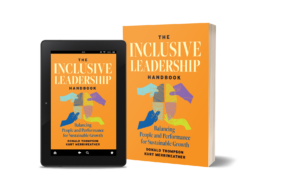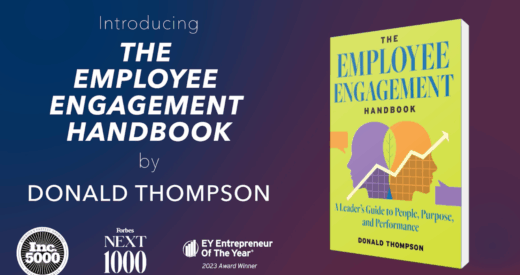 The Inclusive Leadership Handbook is an essential resource for leaders who aspire to create inclusive work environments where individuals feel valued, inspired, and empowered. Packed with practical strategies and insights, this book challenges traditional notions of leadership and provides a roadmap for leaders to embark on their own transformative journey toward inclusive leadership excellence.
The Inclusive Leadership Handbook is an essential resource for leaders who aspire to create inclusive work environments where individuals feel valued, inspired, and empowered. Packed with practical strategies and insights, this book challenges traditional notions of leadership and provides a roadmap for leaders to embark on their own transformative journey toward inclusive leadership excellence.
Below is an exclusive excerpt that focuses on the impact inclusive leadership can have on the modern workplace. Enjoy!
There is a leadership revolution underfoot and the clock is ticking. The future of your organization hinges on whether or not you step up. Do you want to be the one who met the challenge or the person responsible for your organization’s demise? The stakes are that high!
What we’re declaring the future of leadership is “inclusive leadership,” a people-first approach characterized by strong relationships built on trust and respect. Unlike outdated strategic management models that treat employees as incidental, inclusive leaders prioritize their team members and create opportunities for them to contribute their best work. The result is a two-pronged outcome that benefits the organization—a stronger culture built for success and a workforce powered by creativity, collaboration, and innovation.
Inclusive leadership is the ability to instill in others a sense of unique value and belonging in the organization or team in order to meet organizational financial and business outcomes
—The Diversity Movement
Here’s what’s happened—the expectation people have of their leaders has changed in recent years. Much of the new perspective has been driven by disruptive societal forces that have shaken the world in recent years (e.g., geopolitical instability, economic uncertainty, diversity tensions, and global warfare), technical innovations like AI, and generational differences that have shaped and molded new ways of thinking. Quite frankly, what it takes to lead effectively is different than it has been in the past. As a result, a revolution is underfoot and has transformed the way executives must lead.
Every nation on earth is confronted with monumental challenges, while also operating in systems that many people no longer trust. Institutions that were at one time considered pillars of society are being questioned or even scorned. In this vacuum, organizations and their leaders are being called to play a larger role in addressing the world’s most pressing problems. From every perspective, a leader’s ability to establish and sustain culture through a shared set of values and beliefs that guide behavior will determine success or failure.
We deeply believe that inclusive leadership is the paradigm that will take executives and teams toward a successful future. Excellent organizations filled with inclusive leaders at every level will have a geometrically outsized imprint on society. The principles at the core of inclusive leadership—built and strengthened in the workplace—filter into homes and communities. What we have seen firsthand is that inclusive leaders take those practices into their personal lives, thus helping build more inclusive and equitable cultures, whether this effort is in philanthropic work, coaching youth sports, or work with nonprofit or religious organizations.
Inclusive leaders align the interests of their team with larger organizational goals, promoting a “win-win” mentality. The success of the employee is linked directly to the company’s success. With culture being a central facet of managing people across teams and geographies, an inclusive leader adds value based on their understanding of the importance of diversity, equity, and inclusion (DEI) in building stronger relationships. Creating a culture centered on employee well-being and belonging fosters a more sustainable workplace environment where people feel valued and respected.
Let’s not begin by thinking that inclusive leadership only resides in the C-suite or among extraordinary individuals who have some unusual gift or insight. Leadership is not limited by formal title, position, or pedigree. One doesn’t even need to be part of what organizations traditionally deem “leadership.” An individual can manifest the strongest attributes of inclusive leadership by building relationships, elevating the work of colleagues, and influencing others in positive ways. Clearly, from this perspective, those who implement the foundational ideas at the heart of inclusive leadership can have an outsized impact on their organizations and the broader society. Developing the inclusive leadership skills outlined in this handbook will help every person, whether early in their career or with deep experience, create a mindset built on trust, accountability, collaboration, and innovation.
As a matter of fact, we believe that inclusive leadership should be part of undergraduate and graduate business school curriculums, alongside ethics training and a stronger emphasis on the changing nature of managerial studies. Here’s why: what we have seen through programs with hundreds of clients and tens of thousands of employees is that leaders who recognize the importance of DEI-led culture understand how it drives better business performance. Simply put, every future executive needs to know how shaping culture leads to stronger financial outcomes.
Learn more about inclusive leadership and its principles in The Inclusive Leadership Handbook: Balancing People and Performance for Sustainable Growth, by Donald Thompson, CEO, and Kurt Merriweather, VP of Marketing. The book contains opportunities for deep reflection, including exercises and thought/essay prompts, enabling readers to move from theoretical idea to implementation. The Diversity Movement has also created LeaderView, a leadership assessment tool that uses cultural competency as a driver for improving whole team performance.




